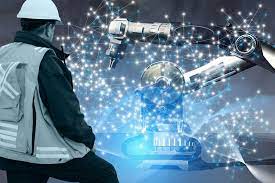
AI is the Future of Industrial Automation.
Why AI is the Future of Industrial Automation: Benefits and Advancements
Industrial automation is rapidly evolving, and artificial intelligence (AI) is leading the charge. From manufacturing to logistics, AI-driven automation is revolutionizing the way businesses operate. The benefits of AI in industrial automation include increased efficiency, reduced costs, and improved quality control. Moreover, advancements in AI technology are making it even more sophisticated and capable of handling complex tasks that were previously impossible. This article will explore why AI is the future of industrial automation and take a closer look at the benefits and advancements driving this transformation. So, if you’re curious about how Artificial Intelligence is shaping the future of industrial automation, read on!
Benefits of Artificial Intelligence in Industrial Automation:
The benefits of Artificial Intelligence in industrial automation are numerous and far-reaching. One of the most significant advantages is increased efficiency. AI-driven automation can perform repetitive tasks faster and more accurately than humans, resulting in faster production times and increased output. This increased efficiency translates into cost savings, requiring fewer resources to achieve the same output level.
Another benefit of AI in industrial automation is improved quality control. AI-powered sensors and cameras can detect product defects much faster than human inspectors, reducing the likelihood of defective products making it to market. This results in higher customer satisfaction and reduced costs associated with product recall.
AI in industrial automation also has the potential to improve workplace safety. By automating hazardous tasks, such as handling dangerous chemicals or operating heavy machinery, the risk of workplace accidents can be significantly reduced. This benefits workers and reduces the costs associated with workplace injuries and accidents.
Advancements in Artificial Intelligence and Industrial Automation:
Advancements in AI technology are making it even more sophisticated and capable of handling complex tasks that were previously impossible. One of the most significant advancements in AI and industrial automation is the development of machine learning algorithms. These algorithms can analyze and learn from vast amounts of data, allowing them to make increasingly accurate predictions and decisions over time.
Another significant advancement is the development of autonomous robots. These robots can perform complex tasks without human intervention, such as navigating a warehouse to pick up and pack orders. Autonomous robots are becoming increasingly common in logistics and manufacturing, as they can work around the clock without needing breaks or rest.
The development of natural language processing (NLP) is also a significant advancement in Artificial Intelligence and industrial automation. NLP allows machines to understand and interpret human language, enabling them to interact with humans more naturally and intuitively. This has applications in customer service, where chatbots can assist customers with their inquiries without human intervention.
Use Cases of Artificial Intelligence in Industrial Automation:
AI is being used in a wide range of industries and applications. AI-powered robots can perform tasks such as assembly, welding, and painting in manufacturing. Autonomous vehicles and drones are used for delivery and inventory management. In healthcare, Artificial Intelligence is used to analyze medical images and diagnose.
AI is also being used in predictive maintenance. By analyzing data from sensors and machines, AI algorithms can predict when maintenance is required, reducing downtime and maintenance costs. This has applications in industries such as oil and gas, where downtime can be costly and dangerous.
Another use case for Artificial Intelligence in industrial automation is quality control. AI-powered cameras and sensors can detect product defects much faster than human inspectors, reducing the likelihood of defective products making it to market. This results in higher customer satisfaction and reduced costs associated with product recall.
Challenges and Limitations of Artificial Intelligence in Industrial Automation:
While the benefits of Artificial Intelligence in industrial automation are significant, there are also challenges and limitations to consider. One of the biggest challenges is the cost of implementing AI. The technology required for AI is expensive, and many businesses may need more resources to invest in it.
Another challenge is the need for more skilled workers. As AI becomes more prevalent in industrial automation, the demand for skilled workers who can work with the technology will increase. However, there is a need for more workers with the required skills and knowledge.
There are also limitations to the capabilities of Artificial Intelligence in industrial automation. While AI can perform many tasks with greater efficiency and accuracy than humans, tasks still require human intervention. For example, jobs that require creativity, empathy, or critical thinking are still best performed by humans.
The Future of Artificial Intelligence in Industrial Automation:

The future of AI in industrial automation is bright, with the technology set to transform how businesses operate. Artificial Intelligence can handle increasingly complex tasks as it becomes more sophisticated and capable. This will result in greater efficiency, reduced costs, and improved quality control.
The development of autonomous systems is also set to revolutionize the way logistics and manufacturing operate. Autonomous vehicles and drones will become increasingly common, as will autonomous robots in warehouses and factories.
The use of Artificial Intelligence in predictive maintenance is also set to increase, with more businesses adopting the technology to reduce downtime and maintenance costs. This will significantly benefit industries such as oil and gas, where downtime can be costly and dangerous.
How to Implement Artificial Intelligence in Industrial Automation?
Implementing AI in industrial automation requires careful planning and consideration. The first step is identifying the tasks and processes that could benefit from automation. Businesses should then evaluate the available AI technologies and determine which suits their needs best.
Once the technology has been selected, it is essential to ensure that the necessary infrastructure is in place to support it. This may include upgrading hardware and software and training staff on how to use the technology.
Businesses should also consider the ethical implications of using AI in industrial automation. This includes ensuring that the technology is used responsibly and ethically, not resulting in job losses or other negative consequences.
Key Players in Artificial Intelligence and Industrial Automation:
There are several key players in the AI and industrial automation space. These include companies such as Amazon, Google, and Microsoft, which are developing AI technologies for various applications. Other companies, such as ABB and Siemens, focus on developing industrial automation solutions incorporating AI.
Startups are also playing a significant role in developing AI and industrial automation. These companies are focused on developing niche solutions that address specific industry needs, such as predictive maintenance or autonomous vehicles.
Artificial Intelligence and Industrial Automation Job Opportunities:
The rise of AI and industrial automation has created many new job opportunities. These include roles such as AI engineers, data scientists, and automation technicians. There currently needs to be more skilled workers in these areas, making it an excellent career choice for those with the right skills and qualifications.
The demand for AI and industrial automation skills is set to increase in the coming years, as more businesses adopt the technology. This will create even more job opportunities, particularly in industries such as manufacturing and logistics.
Summary / Conclusion:
AI is the future of industrial automation and its numerous and far-reaching benefits. From increased efficiency to improved quality control, AI-powered automation transforms businesses’ operations. Moreover, advancements in AI technology are making it even more sophisticated and capable of handling complex tasks that were previously impossible.
While there are challenges and limitations to consider, the future of AI in industrial automation is bright. Businesses that embrace technology and invest in the necessary infrastructure and skills will be well-positioned to succeed in the years ahead. So, if you’re interested in the future of industrial automation, now is the time to start exploring the possibilities of AI.
